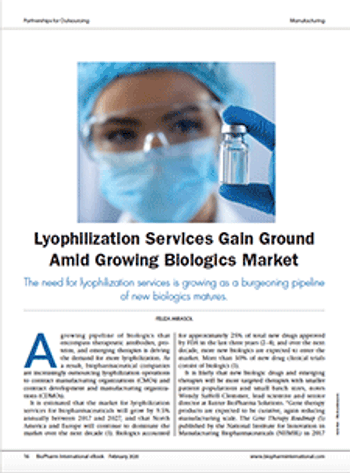
The companies aim to develop novel cell therapies for treating multiple cancers.

The companies aim to develop novel cell therapies for treating multiple cancers.

WuXi Vaccines, WuXi Biologics’ joint venture with Shanghai Hile Bio-technology, has signed a 20-year vaccine manufacturing contract with a global vaccine leader for $3 billion.

Sanofi will use a recombinant DNA platform that produces a genetic match to proteins found on the surface of COVID-19 to formulate the vaccine.

The need for lyophilization services is growing as a burgeoning pipeline of new biologics matures.

CMOs and CDMOs expanded their services and facilities in 2019 and early 2020.

The companies have entered into a global licensing and collaboration agreement to commercialize ReForm excipients used in biotherapeutic formulations.

Through the agreement, Catalent will offer process optimization and drug substance manufacturing services for the drug candidate at its Madison, WI site.

Aimmune plans to introduce the antibody as an adjunctive treatment with its Characterized Oral Desensitized ImmunoTherapy programs to research treatment outcomes in patients with food allergies.

The partners will collaborate on developing scale-up chip-based technology to enable commercial-scale production of a third-generation DNA synthesis platform.

Clinical manufacturing of the therapy will take place at Lonza's Houston, TX, and Netherlands cGMP manufacturing sites.

The new course is directed at analyzing the skills gap in the manufacture of cell and gene therapies as they progress toward manufacturing at scale.

The agreement centers around the development of new stem-cell derived allogeneic T-cell therapies for the treatment of cancer.

Through the agreement, Eli will expand its immunology pipeline with lebrikizumab, Dermira’s novel, investigational, monoclonal antibody designed to bind interleukin-13 with high affinity.

The therapy is currently approved in the EU as a gene therapy for the treatment of patients 12 years and older with transfusion-dependent β-thalassemia.

The companies will kick off their partnership with CPhI North America, a conference that hosts the North American pharmaceutical supply chain.

Under the agreement, Almirall will leverage WuXi Biologics’ proprietary WuXiBody platform to develop bispecific antibodies for dermatological diseases.

The joint venture will develop next-generation cell and gene therapies incorporating Affimer proteins.

Boehringer Ingelheim Biopharmaceuticals China is the first company to apply the adopted Marketing Authorization Holder system within the revised Chinese Drug Administration Law through its partnership with BeiGene for its monoclonal antibody, tislelizumab.

Through the collaboration, Charles River plans to expand its suite of authentic human cells by utilizing Bit Bio’s target discovery, validation, and screening services to further the development of therapies with a higher chance of success in patients.

The acquisition boosts Sanofi’s pipeline of immuno-oncology product candidates with a lead candidate in development for treating solid-tumor-type cancers.

Under the restructuring, Sanofi will gain sole global rights to Kevzara (sarilumab) and sole ex-US rights to Praluent (alirocumab), while Regeneron will gain sole US rights to Praluent.

GE Healthcare Life Sciences and Guangzhou Development District Investment Promotion Bureau have signed an agreement to jointly establish a training center for biopharmaceutical professionals.

BioMed X has announced the successful completion of its first joint research project in the fields of COPD and IPF that it had undertaken with Boehringer Ingelheim.

CPI has partnered with ImmunoBiology (ImmBio) for the development of a heat-stabilized formulation of a mutli-antigen vaccine candidate against Pneumococcal diseases.

Iontas has entered into a collaboration agreement with Adaptate Biotherapeutics for the generation and optimization of antibodies for novel immune-oncology targets.